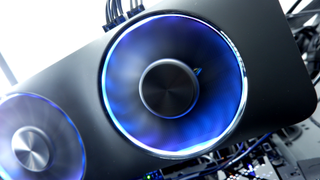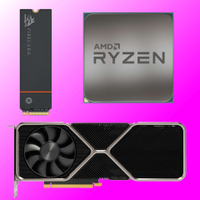A report from noted industry analysts Jon Peddie Research (JPR) last week indicated that Intel had inexplicably managed to achieve parity with AMD's dGPU sales (opens in new tab) having only just got itself into the graphics card game. The ol' Pedster has now fessed up that they got the mathematics all kinds of wrong when counting the chips out.
Intel did not in fact sell the same number of graphics cards as AMD in the last three months of 2022. JPR had erroneously been counting some 60,000+ Ponte Vecchio data centre GPUs that were going into the Aurora supercomputer at the Argonne National Laboratory. And that's are some pricey graphics silicon, which ended up seriously skewing the numbers the analysts were playing around with.
JPR had been using the average selling price of Intel's discrete GPUs to measure its graphics card shipments, and the numbers it had available included all of the company's data centre chips.
It has since remodelled the data and issued an amended graph detailing the revised split in dGPU shipments between Intel, AMD, and Nvidia.
"We have remodeled Intel's Q4 dGPU shipments by subtracting the 60,000-plus-high ASP Ponte Vecchio dGPUs," says Jon Peddie himself (opens in new tab). "We have never counted AMD or Intel GPU-compute GPUs in our quarterly reports and got caught by surprise by Intel. We don't think Intel intended to deliberately mislead the industry and simply isn't used to dGPU consumer vs. data center GPU shipment differentiation—a dGPU is a dGPU (except they aren't)."

So, in the end Intel discrete GPU sales share remained the same between the different quarters (at 6%) leaving AMD still in the lead at 9% of the total shipped graphics cards.
It's interesting to note that when JPR remodelled its data that 3% chunk taken away from Intel just translated into another 3% on top of Nvidia's already hefty lead in the dGPU race. The green team went from having an 82% share of the shipped GPUs to fully 85% of them.
In reality then it doesn't really make for much better reading if you're big on AMD.


